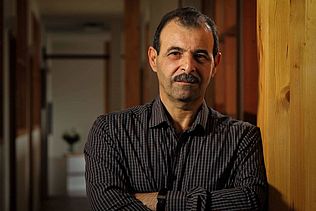At the Turkish-Syrian border, Kurdish cantons have begun to administer themselves. They have also become a refuge for other refugees from persecution in a hopeful but risky experiment on the fringe of the war.
Syria is collapsing, in a process of self-immolation – or so we hear and read everywhere in the media. After three years of civil war, what was once a highly centralised state is now divided into a number of zones of influence. In the north of the country, however, something unexpected is happening, which hardly any political observers had considered. Possibly we are even seeing the redrawing of the map of the Near East. In the middle of the confusion of war, and hidden along the Syrian-Turkish border, the retreat of the central government has given the Syrian Kurds as the biggest minority in the country an opportunity for federal autonomy. After suffering decades of oppression by Assad's Ba'ath Party, forced assimilation and persecution, the Kurds – around 2.5 million strong – are now parading their previously repressed language and culture before the public eye. Kurdish flags line the streets, and children learn Arabic and Kurdish at school. Kurdish settlements have their own police and security forces with a high proportion of women, and are experimenting with direct democracy in their local government.
All this can be seen in the Kobanê district on the Turkish-Syrian border, one of three Kurdish cantons which have begun to administer themselves. There are also Armenians here, whose forefathers fled genocide by the Turks, as well as faith-based communities of Yazidi, Assyrian, Orthodox Christian and Cherkessian Syrians. The canton now has 700,000 inhabitants, three times as many as before the war. The refugees come from Aleppo, Raqqa or Deir el-Zor, from anywhere where they were no longer safe, whether driven by fear of the Syrian army or perhaps even greater fear of the savagery of the Islamist militias. There is still a threat to the democratic experiment in this region, as radical religious terror groups in al Qaeda's orbit are repeatedly attacking Kurdish areas. An additional problem is that medication has been used up in Kobanê, there is neither electricity nor petrol, and flour and vegetables are in short supply.
The Kurds in Turkey are aware of this, and are taking action. With their help, medico sent several consignments of medical emergency aid to the beleaguered 'Rojava' (Kurdish for 'west'), as the Kurds call the areas of Kurdistan in Syria. This aid is unconnected with the major international aid organisations or Western community of values, and is only possible with the help of Kurdish civil society in Turkey. Without the pharmacists who package the drugs in night shifts in the nearby Diyarbakir, without the Kurdish town halls near the border where volunteers labour tirelessly to get permits, coordinate with doctors on the Syrian side, and cajole the border guards to ensure that the roads are actually open, none of the lorryloads of emergency aid would reach Syrian Kurdistan.
Syria is still the major tragedy of our young century, with the civil war entering its fourth year, and even very conservative estimates claiming that an average of 150 people a day have been killed since the start of what began as a call for democracy. medico will continue its emergency aid – in the Kurdish areas of Syria, in Damascus, in Yarmouk Camp with its Palestinian refugees, the city of Erbin, and wherever the war is fiercest. These are the places where Syrian men and women are trying to save the ideals of their uprising – freedom, justice and dignity. The revolutionary dreams have been buried, but the hope for a different Syria will be the last to perish.
medico support for medical emergency aid to the Kurdish regions in Syria in 2013 totalled €60,562

